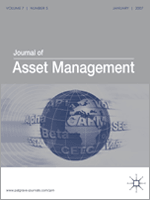
Journal of Asset Management
Scope & Guideline
Navigating the Landscape of Strategic Asset Management
Introduction
Aims and Scopes
- Portfolio Management Strategies:
Research in this area examines various strategies for managing investment portfolios, including risk management, asset allocation, and the application of derivatives to enhance portfolio performance. - ESG and Sustainable Investing:
The journal explores the integration of Environmental, Social, and Governance (ESG) criteria into investment decision-making, assessing their impact on performance, risk, and investor behavior. - Behavioral Finance:
Studies focus on the psychological factors influencing investor decisions, market anomalies, and the implications of behavioral biases for asset management. - Risk Assessment and Management:
The journal covers methodologies for evaluating and managing risk in investment portfolios, including the use of quantitative models and alternative risk metrics. - Emerging Markets and Alternative Assets:
Research highlights investment strategies in emerging markets and the integration of alternative assets, such as cryptocurrencies and green investments, into traditional portfolios.
Trending and Emerging
- Impact of Climate Change:
There is an increasing focus on the financial implications of climate change, including how physical, transition, and regulatory risks affect asset pricing and investment strategies. - Applications of Derivatives:
Research exploring advanced applications of derivatives for risk management and portfolio optimization is on the rise, signifying a growing sophistication in asset management techniques. - Cryptocurrency and Digital Assets:
The emergence of cryptocurrencies as a new asset class has led to a surge in research examining their characteristics, investment potential, and regulatory landscapes. - Behavioral Insights in ESG Investing:
Exploring how investor behavior influences ESG investing and the associated risk-return dynamics is becoming a prominent theme, reflecting a broader interest in the intersection of psychology and finance. - Machine Learning and AI in Finance:
The application of machine learning and artificial intelligence to asset management practices is gaining momentum, with studies focusing on their potential to enhance decision-making and predictive modeling.
Declining or Waning
- Traditional Asset Classes:
There has been a noticeable decline in research focusing solely on traditional asset classes such as equities and fixed income, as newer asset types gain attention. - Basic Portfolio Theory:
The foundational concepts of portfolio theory, such as the mean-variance optimization model, appear to be less frequently discussed, likely overshadowed by more complex and nuanced approaches. - Static Investment Strategies:
There is a waning interest in static investment strategies that do not account for changing market conditions, as dynamic and adaptive strategies become more popular. - Local Market Analysis:
Research that focuses exclusively on local or regional market analysis has decreased, suggesting a growing emphasis on global investment strategies and cross-border asset management.
Similar Journals
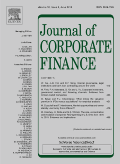
JOURNAL OF CORPORATE FINANCE
Fostering Global Discourse in Financial ManagementJOURNAL OF CORPORATE FINANCE, published by Elsevier, is a premier academic journal that represents the forefront of research in the fields of corporate finance, economics, and management strategies. With an impressive Q1 ranking across multiple categories and a 95th percentile standing in Scopus rankings, this journal is pivotal for advancing knowledge and fostering discourse among scholars, practitioners, and students globally. The Journal has been in continuous publication since 1994 and welcomes submissions that contribute to the understanding of corporate finance and related disciplines. Although it operates under a traditional access model, the Journal offers a rich repository of research outcomes pivotal for informed decision-making in corporate environments. Researchers and professionals looking to enhance their understanding of contemporary finance phenomena will find the JOURNAL OF CORPORATE FINANCE an invaluable resource.
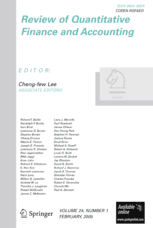
Review of Quantitative Finance and Accounting
Advancing Insights in Quantitative Finance and AccountingThe Review of Quantitative Finance and Accounting, published by Springer, is a distinguished academic journal that has been at the forefront of scholarly discourse since its inception in 1991. With an ISSN of 0924-865X and an E-ISSN of 1573-7179, this journal specializes in the interdisciplinary realms of accounting and finance, particularly emphasizing quantitative methodologies and their applications in real-world scenarios. With an impressive track record reflected in its 2023 rankings, it sits in the Q2 category across key fields such as Accounting, Business Management, and Finance, demonstrating its relevance and influence within these domains. Although it operates without an Open Access option, the journal's content remains vital for researchers, professionals, and students aiming to deepen their understanding of quantitative approaches in finance and accounting contexts. The Review of Quantitative Finance and Accounting stands as an essential resource for advancing knowledge and fostering innovation within these critical disciplines.

Pacific-Basin Finance Journal
Exploring Financial Frontiers in the Pacific BasinPacific-Basin Finance Journal is a prestigious academic journal that focuses on critical developments and innovative research within the fields of finance and economics, specifically tailored to the Pacific region's unique economic landscape. Published by Elsevier, the journal boasts an impressive impact factor and is categorized in the Q1 quartile for both Economics and Econometrics and Finance as of 2023. This indicates its high relevance and position among the top journals in its field, with Scopus rankings reflecting a strong standing in the competitive landscape of finance research, holding the 45th position out of 317 in Finance and the 108th in Econometrics. Established in 1993, the journal is committed to disseminating rigorous theoretical and empirical research findings that enhance the understanding of financial systems in the Pacific Basin. Although the journal is not open access, it provides invaluable insights and comprehensive studies aimed at professionals, researchers, and students alike, fostering a deeper comprehension of the region's economic dynamics and global interconnectedness.
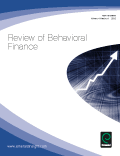
Review of Behavioral Finance
Pioneering Research in Behavioral Finance DynamicsReview of Behavioral Finance is a distinguished journal published by Emerald Group Publishing Ltd, focusing on the dynamic interplay of psychology and finance. With an ISSN of 1940-5979 and an E-ISSN of 1940-5987, this journal serves as a pivotal platform for researchers, professionals, and students keen on exploring innovative behavioral financial practices. Operating from the United Kingdom, the journal has made significant strides since its inception in 2009, converging years up to 2024. It is well-regarded in its field, achieving Q2 rankings in Accounting, Finance, and Strategy and Management for 2023, reflecting its influential contributions to these domains. The journal's rigorous peer-review process guarantees the quality of published research, making it an essential resource for academics seeking to enhance their understanding of behavioral finance. While the journal does not currently offer open access, it remains accessible through various academic databases, facilitating the dissemination of vital financial insights. Engage with the cutting-edge research that shapes the future of finance today!

Journal of Risk
Charting New Territories in Risk AnalysisJournal of Risk, published by INCISIVE MEDIA, serves as an essential platform for scholars and practitioners in the fields of finance and strategic management. With an ISSN of 1465-1211 and an E-ISSN of 1755-2842, this journal explores the multifaceted nature of risk, encompassing theoretical frameworks, empirical investigations, and practical applications. Although currently classified in Q4 for both Finance and Strategy and Management categories as per 2023 standards, it provides a crucial forum for innovative research and thought leadership, addressing the challenges faced in understanding and managing risk in today’s dynamic environment. The journal, based in the United States, is committed to advancing knowledge and offering a platform for debate and dialogue in its convergence years from 2011 to 2024. Researchers, professionals, and students are encouraged to contribute their insights to enhance the academic discourse surrounding risk management.
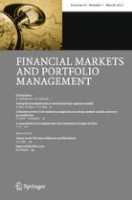
Financial Markets and Portfolio Management
Unveiling Cutting-Edge Research in Financial Management.Financial Markets and Portfolio Management is a renowned peer-reviewed journal published by Springer, focusing on the dynamic and evolving intersections of finance, economics, and accounting. With an ISSN of 1934-4554 and an e-ISSN of 2373-8529, the journal provides a platform for innovative research on financial markets, investment strategies, and portfolio management techniques. It boasts an impactful presence in the academic community, with a Scopus ranking placing it in the 58th percentile in Finance and the 51st percentile in Accounting, underscoring its significance in both fields. Spanning coverage from 2006 to 2024, the journal offers essential insights for researchers, practitioners, and students interested in the latest developments and empirical analyses in financial practices. Although it does not offer open access options, its rigorous editorial standards ensure high-quality content accessible to library and institutional resources. The journal plays a pivotal role in advancing knowledge and fostering dialogue in an increasingly complex financial landscape.
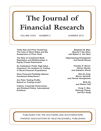
JOURNAL OF FINANCIAL RESEARCH
Empowering Researchers in Financial MethodologiesThe JOURNAL OF FINANCIAL RESEARCH, published by WILEY, stands as a pivotal platform for disseminating innovative research in the fields of finance and accounting since its inception in 1978. With an ISSN of 0270-2592 and an E-ISSN of 1475-6803, this journal aims to address contemporary challenges and trends within the financial research landscape. It has achieved notable recognition, being placed in the Q2 category for both Finance and Accounting in the 2023 rankings, signifying its relevance and impact within the academic community. Although it does not currently offer open access, the journal is accessible through various academic databases, catering to a diverse audience of researchers, professionals, and students keen on advancing their knowledge and understanding of financial systems and methodologies. With an evolving scope that encompasses empirical studies, theoretical frameworks, and practical applications, the JOURNAL OF FINANCIAL RESEARCH is committed to contributing valuable insights into the complexities of financial practices and policies.

Journal of Investing
Connecting theory and practice in the world of finance.Welcome to the Journal of Investing, a critical platform dedicated to advancing knowledge in the fields of finance, strategy, and management of technology and innovation. Published by PAGEANT MEDIA LTD, this esteemed journal, with ISSN 1068-0896 and E-ISSN 2168-8613, provides a scholarly forum for researchers, practitioners, and educators to explore contemporary issues and innovative practices within the investment landscape. With a notable Q3 ranking in Finance, Management of Technology and Innovation, and Strategy and Management, the journal asserts itself as a pivotal resource, contributing to the academic dialogue in these crucial disciplines. Though it operates under a traditional access model, the journal is committed to publishing high-quality research that influences both theoretical and practical dimensions of investing. Join us in exploring vital insights that drive the investment community forward, fostering informed decision-making and strategic development.
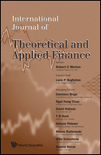
International Journal of Theoretical and Applied Finance
Pioneering insights for a complex financial landscape.International Journal of Theoretical and Applied Finance is a distinguished publication in the field of finance, serving as a critical platform for the dissemination of innovative research and theoretical insights since its inception in 2003. Published by World Scientific Publishing Co Pte Ltd in Singapore, this journal boasts an impressive Q2 ranking in the realms of Economics, Econometrics, and Finance (miscellaneous) and a solid Q3 status in Finance for 2023. With a commitment to advancing knowledge in the complex world of theoretical frameworks and applied financial practices, it welcomes original research articles, comprehensive reviews, and case studies that explore varied facets of finance. Researchers, professionals, and students benefit from the journal's rigorous peer-review process and an ever-expanding repository of knowledge, making it an indispensable resource in the financial academic community. The journal does not currently offer open access, reflecting its selective approach to publishing high-quality content aimed at a specialized audience.

Journal of Investment Strategies
Shaping the Future of Finance with Strategic InsightsThe Journal of Investment Strategies, published by INCISIVE MEDIA, is a distinguished periodical focusing on pivotal issues within the realms of economics, finance, and management. With the ISSN 2047-1238 and E-ISSN 2047-1246, this journal has been making strides since its inception, presenting innovative research from 2018 to 2024. Designated in the Q2 category for both Economics, Econometrics and Finance and Strategy and Management as of 2023, it exemplifies its role as a crucial platform for scholars and practitioners who aim to disseminate knowledge and innovative strategies in investment. Although currently not open access, it provides robust insights into finance advocacy, economic dynamics, and strategic management practices. Researchers, professionals, and students alike can benefit from the journal's high-quality contributions that stimulate discussions and advance the understanding of complex investment landscapes, making it an essential resource in the pursuit of excellence in these competitive fields.